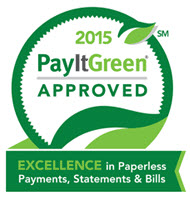In this section:
See if your bank offers bill pay!
Frequently asked questions
What’s an eBill?
If you’re not currently paying bills online, you probably receive all of your bills in your mailbox at home. Many companies you do business with offer you the ability to receive their bill online at their website or through your bank. Fiserv not only powers bill payment services for thousands of U.S. financial institutions, but also bill delivery services for hundreds of companies that issue bills. Review a list of “eBills” you can receive online. And remember, even if you can’t receive your bill online, you can still pay it online, and you can print a copy of anything as needed.
How do I pay an eBill?
eBills are delivered to the websites of companies who you do business with. This could be your bank, credit union, or any company that sends you bills (cable, phone, power, credit card and so on). You’ll find all the same information you’re used to seeing in your paper bills. Then, when you’re ready to pay, all you need to do is choose the amount, schedule the date you want the bill paid and click to pay.
I already automatically deduct some payments from my bank account. Is that the same thing as an eBill?
No, that’s an automatic debit. A car loan payment you’ve authorized your bank to deduct from your account each month is an example. Paying your bills online is sort of like an automatic debit, only better, because you maintain control — you decide when to make a payment and you specify the payment amount. If you want to set up a recurring bill to be paid automatically every month so you can save time, you can — with online bill payment, the choice is yours.
Is paying bills online hard to do?
Paying bills online is easier and takes less time than sorting mail, opening the envelope containing your paper bill, reviewing it, writing a check and keeping manual records of your payments. Once you’ve set up the service, just enter the payment amount, schedule the payment date and you’re done. And, if you’ve got to have paper, print a copy for your files. View an online bill pay demo and see how easy it is.
Where can I pay my bills online?
Most banks and credit unions offer the ability for you to pay bills online — most of them for free. See if your bank offers online bill pay.
Who can I pay online?
Anyone you pay with a paper check. From your mortgage company to your baby sitter.
How can I pay my baby sitter? She doesn’t accept electronic payments.
You really can pay anyone. If your baby sitter or lawn service is not set up to receive electronic payments, you can still enter the payment amount and schedule the payment online. Then, the system will print and mail a check for you. But you are managing everything online.
If I pay bills online, do I give up control of when payments are made?
Absolutely not. You’ll always be in control of your bank account. You decide whom, when and how often to pay. Need to cancel or change a payment? No problem, as long as it’s done before the processing date.
How can I keep track of the bills I pay?
When you pay bills online, the service automatically creates a record of your payments that you can view at any time so you can check the status of your payment. The service actually keeps better records than you keep yourself and you have proof, unlike mailing a check.
How long does it take for the billing company to receive my payment?
At most, four to five business days but many payments can be made the next day. Just check the website of the bank you choose to receive and pay your bills online.
Will my bills be paid on time?
If you use a bank website or portal powered by Fiserv to pay and receive bills online, Fiserv will bear the responsibility for any late-payment-related charges (up to $50) should a payment arrive after its due date as long as you scheduled the transaction in accordance with the service's terms and conditions.
How much does it cost?
The cost depends on the provider you choose. Most banks and credit unions offer this service for free while others charge a small monthly fee. Check the website of your bank or credit union. In most cases, it’s less than you’d spend on stamps.
Is it safe to pay online?
Paying and receiving bills online is more secure than mailing paper checks. And when you use a bank website or portal powered by Fiserv to pay and receive bills online, your protection is guaranteed in the unlikely event of unauthorized transactions or processing delays.
How do I get started?
To start receiving eBills and paying bills online at your bank’s website, you’ll need to make sure this service is offered by your bank. You can find out by using our Bank Search, and follow the simple instructions at their site. Get started now.
Who is Fiserv?
Fiserv, Inc. (NASDAQ: FISV) is a leading global provider of information management and electronic commerce systems for the financial services industry, driving innovation that transforms experiences for financial institutions and their customers. Fiserv-powered electronic billing and payment services are available through thousands of financial services organizations, including banks, brokerage firms, credit unions and personal financial management (PFM) software. At these sites, you can pay all of your household bills and elect the ones you'd like to receive online, too.
We launched the first fully integrated electronic billing and payment solution in the country in 1997, and today, millions of consumers initiate online payments through services powered by Fiserv.
Fiserv continues to set the standard for quality in the electronic billing and payment industry by ensuring your bill payment service is available whenever you want to use it and that your payments are processed accurately and on time.
Fiserv is monitored by the same entities that monitor major financial institutions, including the Office of the Comptroller of the Currency (OCC), the Securities and Exchange Commission (SEC), the Federal Reserve, the United States Postal Service and NACHA — the Electronic Payments Association
To learn more about Fiserv, please visit www.fiserv.com.

